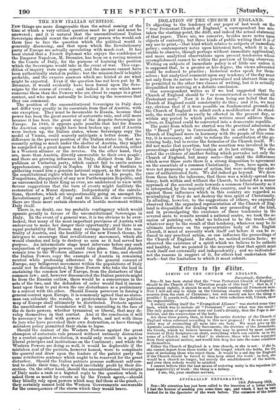ISOLATION OF THE LH URCH IN ENGLAND.
Lv objecting to the tendency of our paper of last week on the "true Protestant Church of England," a correspondent has nus' taken the starting-point, the drift, and indeed the actual statement of that paper. There are, we conceive, besides mere notes upon objects of curiosity, but three kinds of public writing that it is of any use to print,—that kind which relates to subjects of immediate policy; contemporary notes upon historical facts, which it is de- sirable to observe, though perhaps without immediate application; and more analytical observations upon present tendencies whose accomplishment cannot be within the purview of living observers. Writing on subjects of immediate policy is of little use unless it is supposed that, to a greater or less degree, the views advocated could be reduced to practice ; historical notes speak for them- selves ; but analytical commelit upon any tendency of the day must not only from its nature be more generalized and abstract than can be permitted to the other two classes of writing, but it is actually disqualified for arriving at a definite conclusion.
Our correspondent writes as if we had suggested that the Church of England should be "so reconstructed as to combine all Protestant sects." Now it is far from being our belief that the Church of England could consistently do this ; and it is, we may say, obvious that if it were possible on fundamental grounds for the Church of England to admit such a modification of its stand- ards, the result could as easily be effected in the present day, or within any period to which public writers must address them- selves, as England could be converted into a democratic republic.
The point from which we started was the practical admission of the "Broad" party in Convocation, that in order to place the Church of England more in harmony with the people of this coun- try, it is necessary, not only to reform the constitution of the go- verning body, but to revise the formulas of the Church itself. We did not make that assertion, but the assertion was involved in the proceedings adopted by Convocation at its last sitting. We also noted the evidence of another feeling which pervades not only the Church of England, but many sects—that amid the differences which sever those sects there is a strong disposition to agreement on the essentials of a common Christianity. Now, here again, we were not proposing a course of action, but were noting the exist- ence of authenticated facts. We did indeed go beyond. We drew from those facts the inference, that there was a widely-spread ten- dency, both within and without the Church, to labour for a nearer approach of the severed sects towards a common Christianity as it is interpreted, by the majority of this country, and to act in union against those influences which in this country are regarded as neutralizing if they do not destroy the true spirit of Christianity. In alluding, however, to the suggestions of others, we expressly observed that the organized representation of the Church of Eng- land is disqualified for dealing with any proceeding of the kind, and in promulgating the existence of these tendencies in the severed sects to reunite around a national centre, we took the oc- casion of pointing out, what we believed to be the truth—that whatever may be the result of that tendency, whatever may be its ultimate influence on the representative body of the English Church, it must of necessity work itself out before it can be re- duced to any practical action, or can influence the proceedings of the Church of England. In short, we noticed certain facts; we observed the existence of a spirit which we believe to be catholic and healthy, but we pointed to the necessity that that spirit must work itself out externally and independently; and we indicated— not the reasons in support of it, for others had undertaken that work—but the limitation to which it must submit.
































 Previous page
Previous page